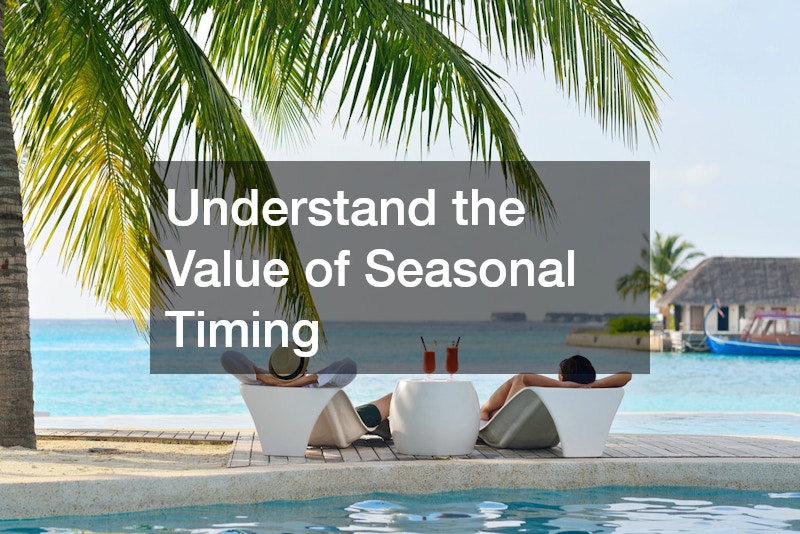
Selling a vacation home is not just a real estate transaction—it’s the end of a chapter filled with memories and personal meaning. Whether it’s been a cherished retreat or an investment property, putting a vacation home on the market requires careful planning, strategic presentation, and legal awareness. Unlike a primary residence, a vacation property may come with added complications like out-of-state regulations, seasonal accessibility, or long-distance coordination.
Navigating the process successfully means understanding your goals, preparing the property properly, and working with experienced professionals who know the ins and outs of second-home sales. If you’re ready to move on from your getaway house, the steps you take now can significantly impact your return on investment and how smoothly the transaction plays out. Below, we’ll walk through all the essential actions you should take when selling a vacation home—from early prep work to closing day.
Understand Your Motivations and Set Clear Goals
Before listing your property, take time to assess why you’re selling and what you hope to gain. Are you downsizing, reallocating funds, or simply no longer using the space? Your motivations will shape how you price the home, market it, and negotiate with potential buyers. If maximizing profit is your goal, you may want to invest in certain upgrades. If you’re looking for a fast sale, pricing competitively from the start might take priority.
You should also think about the tax implications when selling a vacation home. Selling a vacation home may trigger capital gains taxes, especially if the property appreciated significantly in value. Unlike a primary residence, you can’t exclude up to $250,000 ($500,000 for married couples) of profit from taxation unless certain ownership and use requirements are met. Consulting a tax professional early in the process can help you prepare for what lies ahead.
Work With a Local Real Estate Expert
Choosing the right real estate agent is critical when selling a vacation home, especially if the property is located in a seasonal or remote market. Look for real estate brokers who specialize in vacation properties and understand the unique selling points of your region—whether it’s mountain views, waterfront access, or proximity to tourist attractions.
An experienced agent will know how to target vacation home buyers, price the property according to comparable sales, and promote your listing across the right channels. They’ll also understand the seasonal timing that can affect second-home sales. For instance, a ski chalet may get more attention in fall and early winter, while a beach home might sell best in spring or early summer.
Stage the Property for a Lifestyle, Not Just a Sale
Buyers shopping for a vacation home aren’t just looking for square footage—they’re envisioning a lifestyle. That means your staging should go beyond basic decluttering. Emphasize elements that speak to relaxation, recreation, and comfort. If the home has a fireplace, make sure it’s spotless and well-presented. If it features outdoor space, set up the patio or deck to look like a private retreat.
Consider hiring professional landscape designers to refresh the yard, garden, or any outdoor entertainment areas. Even small touches like flower beds, trimmed hedges, or outdoor lighting can make a huge difference in curb appeal. The goal is to create a welcoming environment that encourages prospective buyers to imagine themselves unwinding there with family and friends.
Inside the home, aim for a clean, neutral, and slightly upscale look. You want the space to feel like a getaway, not just a place to crash. Avoid personal clutter and seasonal décor unless you’re marketing it for a specific holiday market.
Make Necessary Repairs and Upgrades
Minor flaws and deferred maintenance can be red flags to buyers—especially if they’re paying cash or expect a turnkey property. Before listing, take stock of any necessary repairs, from leaky faucets to damaged siding. Buyers in the vacation market often expect properties to be move-in ready, and they may be less willing to compromise compared to primary residence buyers.
If you’ve been using the home sparingly, you might overlook functional systems that haven’t been used in a while. It’s a smart idea to have a local plumber inspect the pipes and fixtures to ensure there are no hidden leaks or water damage. Likewise, make sure the HVAC system is in good shape, and check on water appliances. If your hot water system is outdated or malfunctioning, it could be worth replacing or servicing it with help from a water heater repair company before listing.
Not every improvement needs to be major. Fresh paint, new light fixtures, and updated cabinet hardware can modernize a dated interior and make your property stand out in photos. Even something as simple as replacing old door handles can make the space feel better maintained and more desirable.
Deep Clean and Declutter the Space
No matter how well your property is maintained, a deep clean is essential before showings begin. Vacation homes are especially prone to dust, mildew, or pest issues due to seasonal vacancy, so cleanliness is a top priority. Thoroughly clean every room, paying close attention to windows, floors, and appliances. Don’t forget to freshen up outdoor spaces as well.
If you’re managing the sale remotely, consider hiring a local cleaning crew to do the job professionally. This might include specialists like a local moving services company that also offers debris removal or storage solutions. Removing extra furniture and personal items can make rooms appear larger and more welcoming.
If the property has been a rental, it’s particularly important to replace any worn linens, fix scuffed walls, and sanitize high-touch areas. The cleaner and fresher the space feels, the easier it is for buyers to imagine themselves making new memories there.
Work With a Real Estate Attorney
In many areas, selling a vacation home requires more legal oversight than a standard transaction. That’s why working with a real estate law firm or independent real estate attorneys is highly recommended—especially if the home is out of state or part of a homeowner association (HOA).
Your attorney can review contracts, navigate title transfers, help you understand disclosure obligations, and ensure compliance with state-specific rules. They’ll also be invaluable if you’re selling remotely or handling the transaction across multiple jurisdictions. A real estate attorney can also advise on property tax laws, deed restrictions, and HOA requirements that could complicate the sale.
If the property is held in a trust or shared ownership arrangement, their expertise will be crucial for ensuring proper execution. Don’t wait until a problem arises—get legal representation involved from the beginning for peace of mind.
Understand the Value of Seasonal Timing
Unlike primary residences, vacation homes are typically in demand during specific seasons. Selling a ski lodge in the middle of summer or a beach house during the dead of winter might lead to limited buyer interest. For the best results, plan to list during your region’s peak season.
Your real estate agent can help you assess when your local market heats up and how far in advance buyers typically begin searching. In some vacation markets, buyers plan months ahead to ensure they can enjoy the property the following season. Listing just before this wave begins can help your home get early visibility and sell quickly.
If you’re listing during the off-season, make sure your home is still easy to access and showcases well in photos. Consider seasonal staging and updated images to help buyers imagine the property in its full glory, even if the weather is less than ideal.
Highlight Key Features in Your Marketing
Marketing a vacation property is about more than listing square footage and bedroom counts. Emphasize features that make the home unique or enhance the vacation experience. These might include lake access, proximity to ski resorts, private decks, hot tubs, walking trails, or community amenities like pools and tennis courts.
Photos and videos play a huge role in attracting buyers to vacation homes. Consider hiring a professional photographer and videographer who specializes in real estate for sale. Drone shots, virtual walkthroughs, and lifestyle footage can help your listing stand out and attract buyers who might not be local.
Your agent should also leverage social media, second-home buying platforms, and possibly international portals if the area attracts out-of-country investors. Selling a vacation home often means appealing to a broader and more diverse buyer pool, so marketing strategy needs to reflect that.
Price It Right From the Start
Pricing a vacation home can be more complex than pricing a primary residence. Market comps may be limited, and the value can vary widely depending on views, proximity to attractions, rental potential, and recent updates. If your home is in a popular vacation destination with lots of seasonal turnover, pricing it competitively is critical to getting buyer attention.
At the same time, pricing too low might leave money on the table—especially if inventory is limited and demand is high. A good real estate agent will conduct a thorough comparative market analysis and provide insight into current buyer trends. They’ll also take into account intangibles like architectural style, privacy, and the condition of nearby properties.
Remember that overpricing a home, especially one that buyers don’t “need,” can lead to extended time on the market. A stale listing can be a red flag, so setting the right price early gives you a better chance at a smooth sale.
Manage the Transition Logistically
The logistics of vacating and transferring a vacation home can be tricky—especially if you live far away or can’t be there in person. This is where advanced planning and a local support network become crucial. If you’re not on-site, you’ll need help coordinating everything from cleaning to inspections and showings.
You may want to work with a local moving services provider who can help pack, haul, and possibly store belongings you wish to keep. Make sure you also have contractors available to handle final fixes or repairs post-inspection. If you’ve been using a landscaping contractor to maintain the exterior, keep them on until the property is sold to ensure curb appeal remains strong.
Being organized on your end will also help ensure a smooth handoff to the new owner. Leave behind manuals, warranties, spare keys, and any relevant HOA documents. If your home includes smart technology or security systems, prepare clear instructions or transfer accounts to the buyer.
Consider the Local Property Market Conditions
No matter how much time and effort you put into preparing the property, you can’t control the market. That’s why it’s essential to have a clear understanding of current real estate conditions in the area. Are homes selling quickly? Is inventory high or low? Are interest rates affecting buyer behavior?
If your property is in a vacation town where there’s a new land for sale development or recent commercial growth, that may increase interest in your listing. On the flip side, if the area has just come off a building boom and inventory is saturated, pricing aggressively may be necessary.
Your agent can help you interpret trends and adjust your approach accordingly. Being flexible and informed is key when selling a vacation home in a fluctuating or seasonal market.
Prepare for Inspection and Appraisal
Just like a primary residence, a vacation home will need to pass inspection and appraisal before the sale closes. Be proactive in addressing any issues that might arise. Buyers may be especially wary of deferred maintenance in second homes, so take the time to prep the property thoroughly.
Consider having a pre-listing inspection done so you can fix potential issues in advance. That includes checking systems like heating, plumbing, and roofing. If you’ve had issues in the past with leaks or appliance failures, get those systems checked by a licensed contractor. Something like a faulty water heater, for instance, could delay the sale if not handled early by a water heater repair company.
The appraisal process will also be influenced by the condition of the home and any recent upgrades. Having a clean, well-maintained, and updated property increases the likelihood of meeting or exceeding the appraised value, which is critical if your buyer is financing the purchase.
Selling a vacation home takes more than listing it and hoping for the best—it requires strategy, preparation, and local expertise. From understanding tax implications to marketing lifestyle appeal, each step you take can significantly impact your return on investment and how smoothly the transaction proceeds.
Whether you’re working with top-tier real estate brokers, coordinating with a real estate law firm, or hiring professionals like a local plumber or landscaping contractor to prep the home, assembling the right team makes a world of difference. Thoughtful staging, strategic pricing, and proactive maintenance all help attract the right buyer and make your listing stand out.
Ultimately, selling a vacation home is about creating a seamless transition—for both you and the next person who’ll make memories there. With careful planning and smart execution, you can close this chapter confidently and move forward to whatever comes next.



